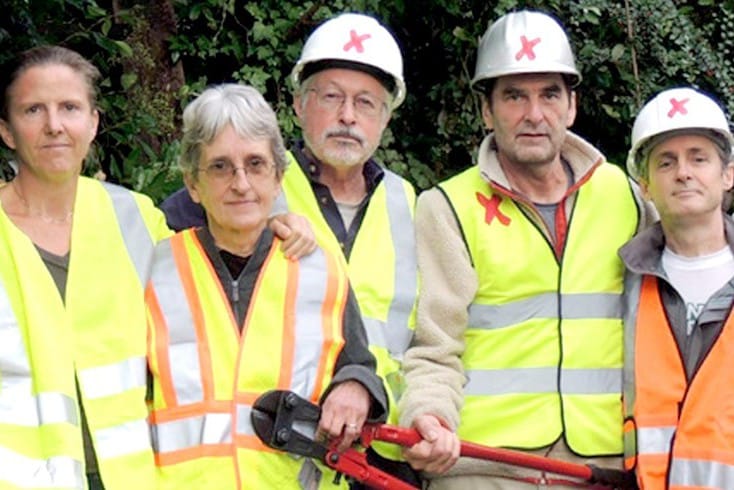Mount Vernon, WA — In a victory for the climate movement, a jury was unable to reach a verdict in the trial of Ken Ward, a climate activist from Corbett, Oregon, who had been charged with sabotage and burglary after an October 2016 protest in which he and four other activists temporarily blocked the flow of tar sands oil from Canada into the United States. Mr. Ward, a veteran environmentalist who for years pursued legal avenues to address climate change before turning to civil disobedience, testified during the two-day trial that his actions were intended to block the passage of harmful fuels into the United States and to inspire individuals and political leaders to act to avert catastrophic global warming. The jury deliberated for several hours over the course of two days before informing Skagit County Judge Michael E. Rickert that they could not reach a verdict.
Because of the mistrial, the prosecution has the option to try Mr. Ward again. A scheduling hearing has been scheduled for February 9, by which time the prosecution is expected to indicate whether it intends to proceed to a second trial.
Mr. Ward admitted that he entered a Kinder Morgan pipeline facility near Anacortes, Washington on October 11, 2016, and turned a valve to shut off the flow of tar sands oil from Canada. At the same time, other activists turned pipeline valves in Montana, North Dakota, and Minnesota. They were responding to a call for action from the Standing Rock pipeline protest in North Dakota.
The mistrial followed a much-criticized pretrial decision by Judge Rickert to prohibit evidence that Mr. Ward’s protest action was justified by the need to avert climate change. Calling the questions of whether climate change exists and what causes it a matter of “tremendous controversy,” Judge Rickert blocked Mr. Ward’s expert witnesses from testifying about the science of climate change, its current and future effects, and the lack of meaningful legal alternatives to address it. Judge Rickert’s statements contradicted scientific consensus about the existence and origins of climate change and seemed to violate well-established rules protecting defendants’ rights to put on a defense. Nevertheless, Mr. Ward was able to personally testify about the motivation for his actions. In addition, during Mr. Ward’s testimony, the judge accepted the scientific fact of record increases of carbon dioxide in the atmosphere. Mr. Ward was then allowed to show the jury a chart published by NASA that illustrated this fact and explain how it impacted his decision to turn the pipeline valve.
Kelsey Skaggs, an attorney with the Climate Defense Project, which provided legal support to Mr. Ward alongside the Civil Liberties Defense Center and Ralph Hurvitz, commented: “The failure of the prosecution’s case shows that public opinion is shifting about the need for direct action to solve the climate crisis. With our political leadership failing us, we need more courageous activists like Ken to stand up to the fossil fuel industry and set an example of how normal people can effect change.”
Mr. Ward’s legal victory comes on the heels of other attempted “climate necessity defenses” and in the midst of a wave of civil disobedience aimed at ending fossil fuel extraction and protecting the climate from extreme warming
The trials for Mr. Ward’s co-activists from the October 2016 action are expected to be held this spring and summer.

